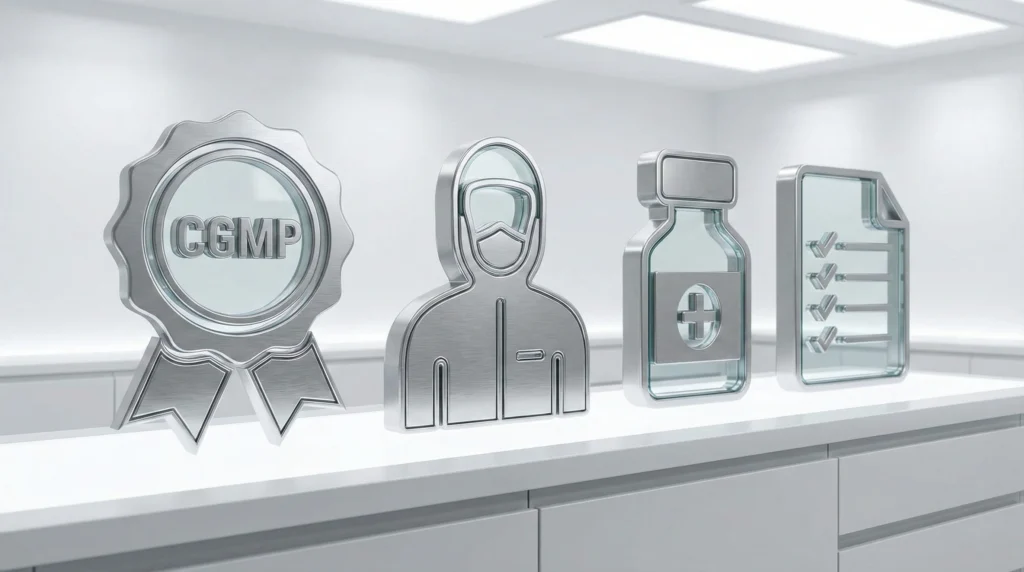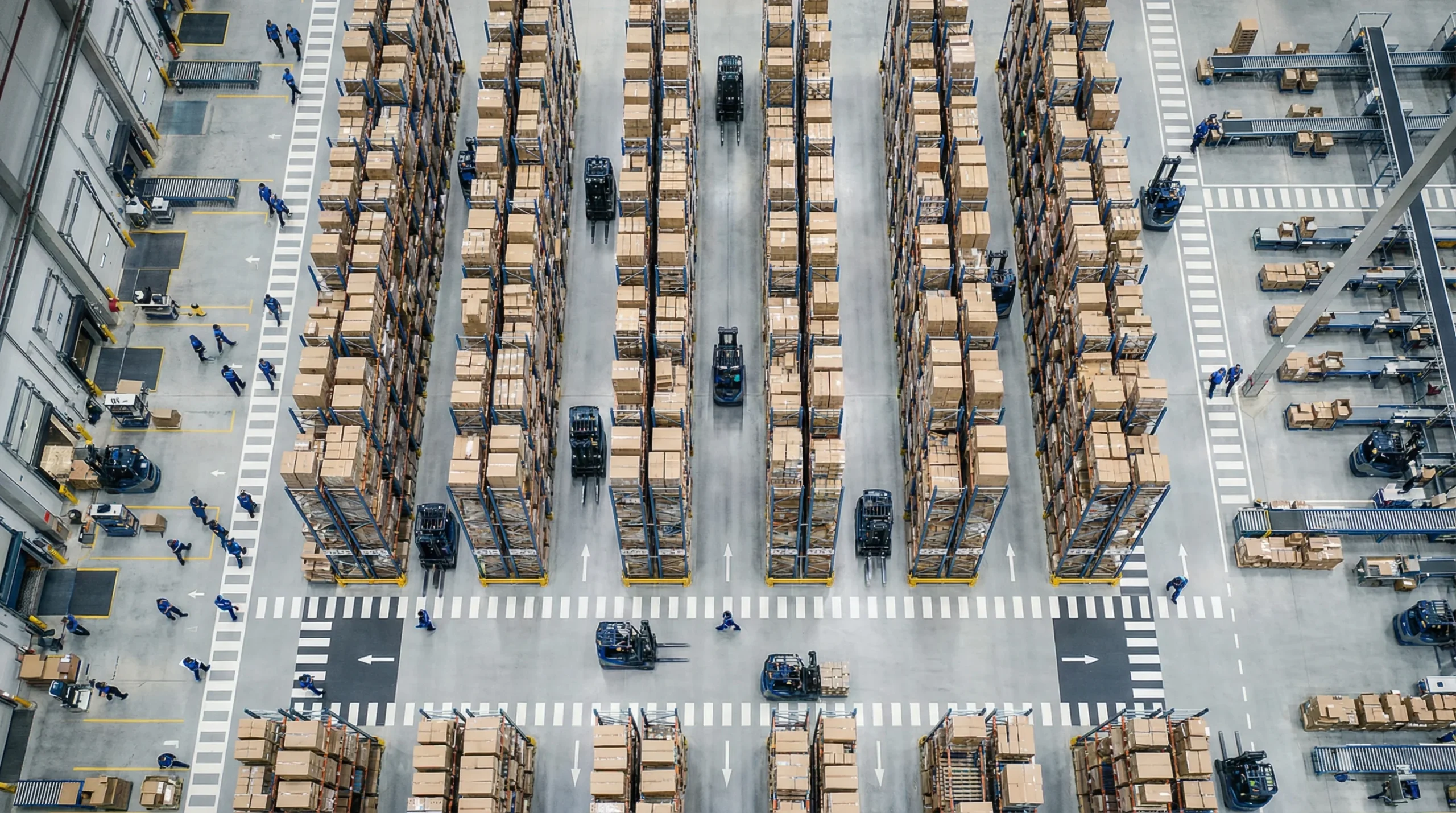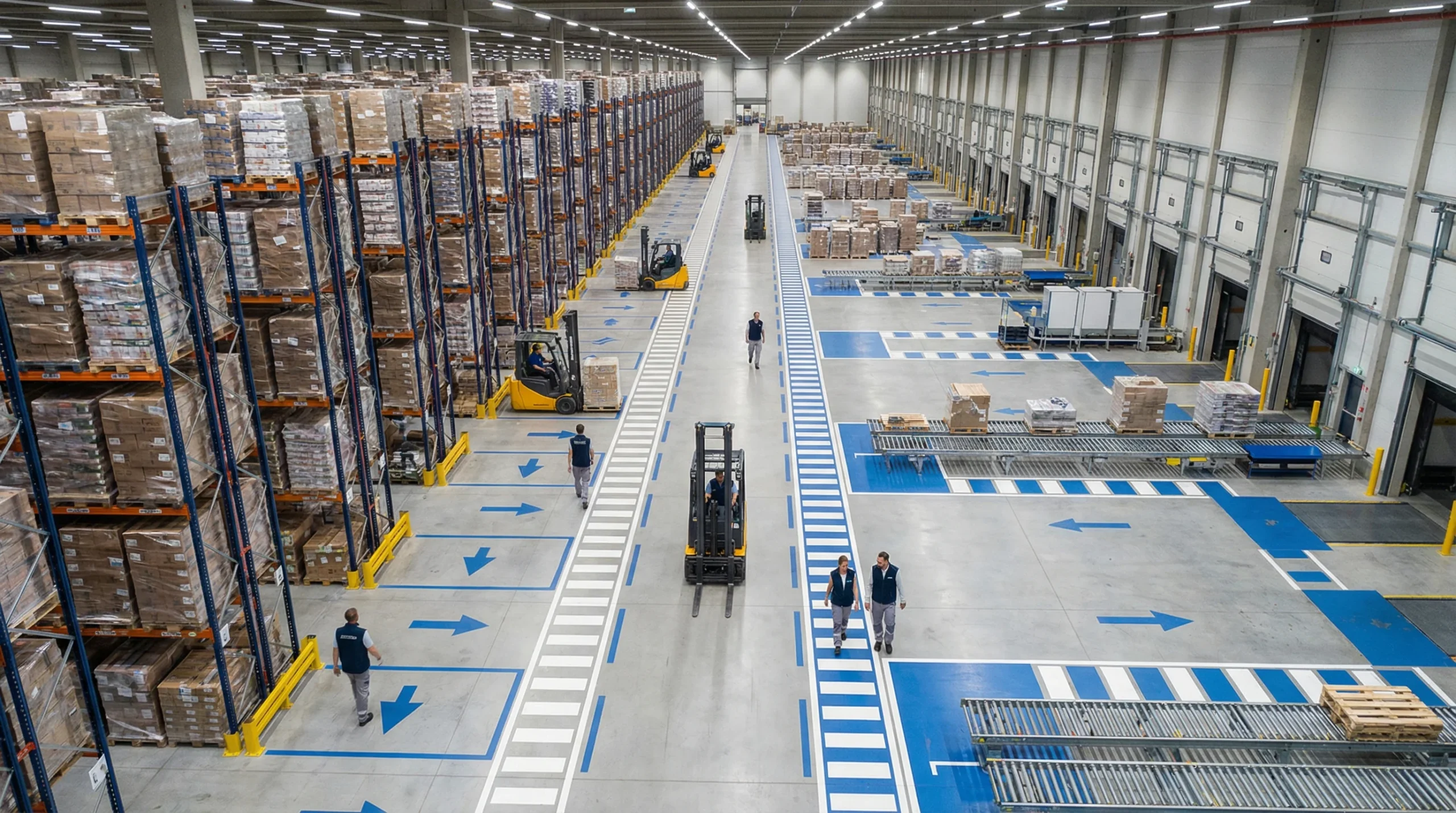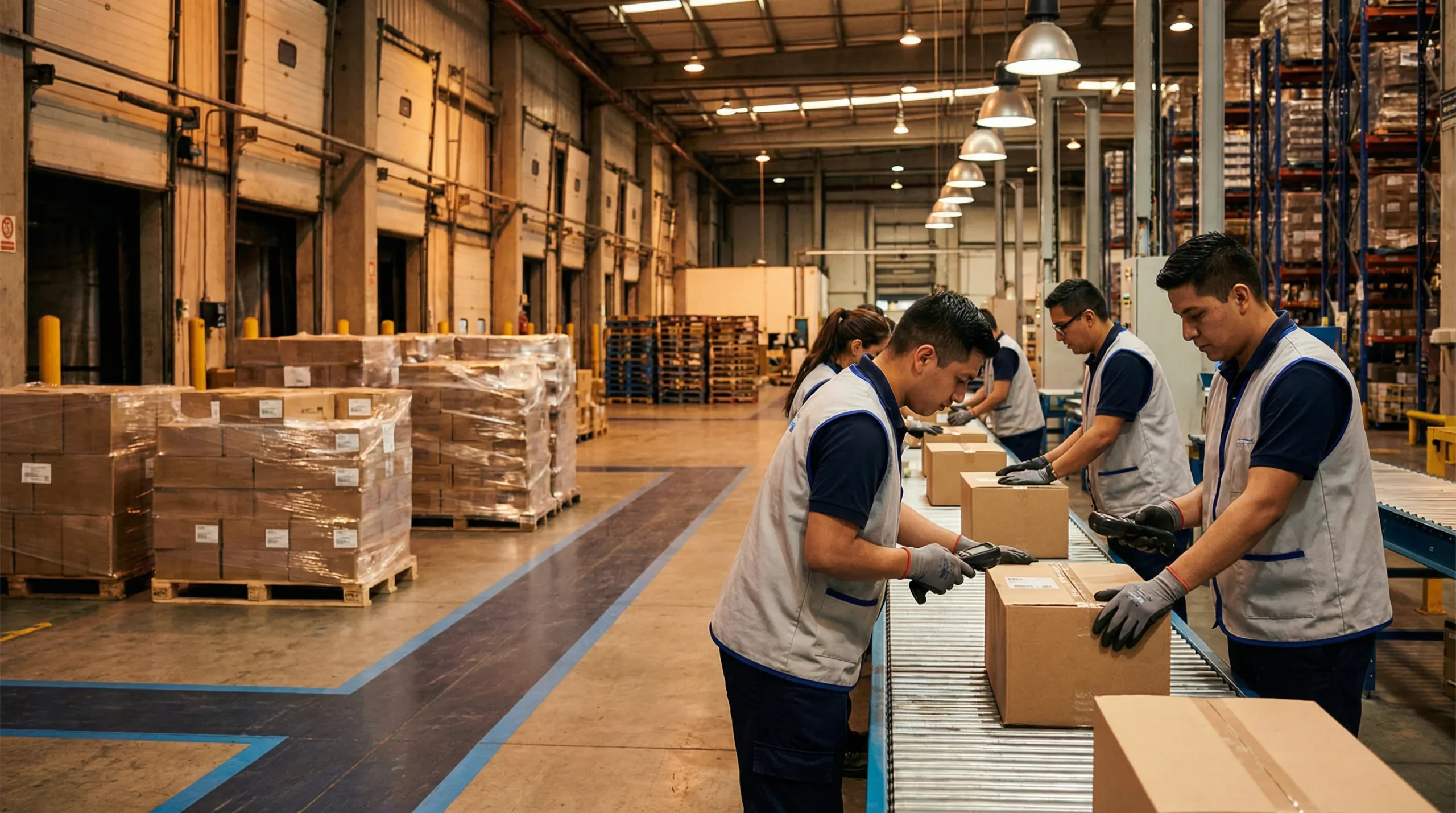Current Good Manufacturing Practices (cGMP) are FDA regulations designed to ensure the safe, consistent production of high-quality products across industries such as pharmaceuticals, food and beverage, medical devices, dietary supplements, and process manufacturing. These guidelines minimize risks like contamination, mislabeling, and production inconsistencies, safeguarding consumer trust and safety. This article provides essential strategies to achieve and maintain cGMP compliance, tailored to the unique challenges of different sectors.
Key Takeaways
- cGMP regulations ensure the consistent production of safe, high-quality products across industries like pharmaceuticals, food and beverage, and process manufacturing by focusing on people, processes, facilities, and documentation.
- Continuous training, regular audits, and the implementation of a Quality Management System (QMS) are crucial for maintaining cGMP compliance and ensuring top-notch manufacturing practices across sectors.
- Emerging technologies, like automated single-use systems, cold chain monitoring, and advanced tracking, are shaping the future of cGMP compliance, enhancing efficiency and product safety.
Purpose-Built for Pharmaceutical Compliance
ASCTrac helps pharmaceutical operations stay GMP-compliant with lot tracking, serialization, and DSCSA-ready workflows.
Request a Demo
Understanding cGMP
Current Good Manufacturing Practices (cGMP) are a set of regulations established by the FDA to ensure the consistent production and control of products across various industries. The core principle of cGMP is to guarantee that products are safe, consistent, and of high quality. These guidelines apply to pharmaceuticals, food and beverage, medical devices, cosmetics, dietary supplements, and other consumer goods.
Covering areas like facilities, equipment, personnel, and procedures, cGMP regulations minimize risks such as contamination, mix-ups, and defects. For example, in food manufacturing, cGMP helps prevent allergen cross-contact and ensures proper storage temperatures. In pharmaceuticals, these practices protect patients by maintaining drug efficacy and safety.
The Food and Drug Administration regulates cGMPs in the United States, conducting inspections and enforcing compliance across industries. Regulations such as 21 CFR Part 211 for pharmaceuticals and 21 CFR Part 117 for food production outline specific requirements tailored to different sectors. Regardless of the industry, cGMP compliance protects consumers, builds trust, and ensures product reliability.

Key cGMP Requirements
Current Good Manufacturing Practices (cGMP) regulate the general manufacturing, processing, packing, and holding of products to ensure safety and quality across industries. The 5 Ps in cGMP manufacturing—People, Premises, Processes, Procedures, and Products—represent the essential pillars that underpin compliance efforts.
- People: Properly trained personnel are critical for maintaining compliance and ensuring product safety. This includes ongoing education on cGMP regulations, job-specific responsibilities, and safety protocols. For example, food and beverage staff must understand allergen management and sanitation practices, while process manufacturers require expertise in handling hazardous materials and following chemical safety standards.
- Premises: Facilities must be designed to support cleanliness, safety, and efficiency. For food manufacturers, this means implementing stringent sanitation protocols and pest control measures. In pharmaceutical production, premises must ensure sterility, while process manufacturing facilities often require robust containment and ventilation systems to safely manage volatile or hazardous chemicals.
- Processes and Procedures: Standardized processes and clear operating procedures ensure that products are manufactured consistently and to the highest quality standards. Food manufacturers rely on validated processes such as pasteurization or freezing to maintain product safety, while process manufacturers must adhere to detailed workflows for chemical reactions or product assembly.
- Products: Ensuring product safety and efficacy requires rigorous testing and quality checks across all industries. Food and beverage companies focus on expiration tracking and real-time quality monitoring, while process manufacturers emphasize uniformity in batch production and detailed traceability of raw materials.
By focusing on these five pillars, manufacturers across sectors can ensure cGMP compliance, safeguard consumer trust, and maintain the integrity of their production processes.
Personnel Qualifications and Training
Having a qualified and fully trained workforce is a cornerstone of cGMP compliance, regardless of the industry. Employees must be continuously educated and trained to ensure they understand cGMP requirements and can perform their roles competently.
- In pharmaceuticals, this involves in-depth training on aseptic techniques, quality assurance processes, and compliance with FDA regulations.
- Food manufacturers must educate staff on allergen management, sanitation protocols, and the safe handling of perishable items.
- Process manufacturers require employees to understand proper handling of hazardous chemicals, equipment safety procedures, and regulatory compliance standards.
Ongoing training programs help organizations adapt to new regulations, refine quality processes, and maintain high standards. Establishing clear roles and responsibilities within the workforce further supports quality assurance efforts, ensuring every team member contributes to maintaining cGMP compliance.
Facility and Equipment Standards
Maintaining facilities and equipment to the highest standards is essential for cGMP compliance in any manufacturing environment. Facilities must be designed and maintained to prevent contamination, ensure product safety, and support operational efficiency.
- Facilities: Food and beverage manufacturers must prioritize sanitation protocols, such as regular cleaning schedules and pest control measures, to maintain a hygienic environment. Pharmaceutical production facilities must ensure sterile conditions, while process manufacturers need specialized ventilation and containment systems to safely manage volatile chemicals.
- Equipment: Properly maintained and calibrated equipment is critical for consistent production quality. Pharmaceutical manufacturers rely on precision instruments to meet stringent safety and efficacy standards. Food manufacturers use temperature-controlled systems to preserve freshness and prevent spoilage. Process manufacturers often require custom-built equipment to handle complex chemical reactions or material handling processes.
Routine risk assessments and preventive maintenance schedules help identify potential hazards and ensure equipment operates reliably. Standard Operating Procedures (SOPs) for cleaning, calibration, and maintenance must be meticulously followed to minimize risks and maintain compliance. Whether ensuring proper sanitation in a food plant or maintaining sterile environments in pharmaceutical production, adherence to facility and equipment standards is fundamental for cGMP compliance.
Process Validation and Documentation
Accurate recordkeeping and rigorous process validation are essential to ensuring consistency, quality, and compliance with cGMP standards. These practices apply across industries, from pharmaceuticals to food and beverage and process manufacturing.
- Validation: Process validation verifies that manufacturing steps consistently produce products that meet quality standards. In pharmaceuticals, this includes testing and documenting every stage of drug production. Food manufacturers validate processes such as cooking, freezing, or pasteurization to ensure safety and compliance. Process manufacturers focus on maintaining consistent chemical formulations and precise reaction conditions.
- Documentation: Comprehensive documentation is key to demonstrating compliance and streamlining audits. This includes detailed production logs, ingredient traceability data, and equipment maintenance schedules. Food manufacturers must document storage temperatures, cleaning schedules, and ingredient sourcing, while process manufacturers record batch data, testing results, and quality assurance protocols.
A robust documentation system supports continuous improvement by identifying and addressing quality issues early. By maintaining accurate, thorough records, companies can not only ensure cGMP compliance but also enhance operational transparency and build trust with regulators and consumers.
Regulatory Framework and Enforcement

The FDA ensures cGMP compliance by establishing regulations, conducting inspections, and verifying product quality across industries. While often associated with pharmaceuticals, cGMP regulations also govern food and beverage production, dietary supplements, medical devices, cosmetics, and process manufacturing. These frameworks help safeguard consumer safety, ensure consistent quality, and minimize risks across diverse sectors.
Pharmaceuticals
The FDA’s 21 CFR Part 211 outlines specific requirements for drug production, addressing personnel qualifications, laboratory controls, and batch documentation. These stringent guidelines ensure the safety, efficacy, and quality of pharmaceutical products.
Food and Beverage
Under the Food Safety Modernization Act (FSMA), cGMP compliance emphasizes hazard analysis and risk-based preventive controls (HARPC) to mitigate contamination risks. Additionally, FDA regulations address cold-chain management, allergen labeling, and sanitary transportation practices to protect public health.
Process Manufacturing
For process manufacturers, FDA regulations are often supplemented by OSHA and EPA guidelines to address the safe handling, storage, and disposal of hazardous chemicals. These frameworks ensure both environmental safety and product quality while maintaining compliance with cGMP standards.
Across all sectors, adhering to these regulations protects consumer trust and supports business longevity. Manufacturers must develop robust compliance strategies to ensure alignment with FDA requirements and demonstrate adherence during inspections.
Implementing a Quality Management System (QMS)
Implementing a Quality Management System (QMS) or electronic QMS software is a cornerstone of achieving and maintaining cGMP compliance. A well-structured QMS integrates cGMP requirements, ensuring quality control across every stage of manufacturing. These systems streamline key processes, emphasizing compliance in areas like documentation, training, and testing to uphold product safety and consistency.
There is a growing trend toward paperless solutions, such as electronic batch records, which enhance operational efficiency while reducing errors. Modern QMS tools also support real-time tracking and analysis, helping manufacturers proactively identify and address quality issues.
Benefits of QMS Software
QMS software automates critical compliance tasks, making it easier to maintain high standards in manufacturing environments. Key benefits include:
- Streamlined Documentation: Centralized and automated document control ensures that records are accurate, up-to-date, and easily accessible for audits.
- Training Management: Scheduling and tracking employee training keeps personnel aligned with cGMP requirements and reduces the risk of compliance failures.
- Improved Quality Control: Real-time monitoring and analytics enable faster identification of potential quality issues, minimizing risks and maintaining consistent product safety.
When selecting QMS software, prioritize solutions with robust document management, ease of use, and seamless integration with existing systems. The right system supports processes like CAPA management, complaint handling, and supplier oversight, enabling efficient compliance with cGMP requirements.
Industry-Specific cGMP Applications
cGMP regulations are enforced by the FDA and cover a wide range of products, including human drug products, biologics, medical devices, food, beverages, dietary supplements, and cosmetics. These regulations ensure that products are manufactured to the highest quality and safety standards, protecting consumers from potential risks. Various industries have specific cGMP requirements to ensure compliance.
cGMP for Pharmaceutical Products
cGMP requirements for raw materials used in drug manufacturing necessitate verifiable quality and compliance with all applicable regulatory requirements. Suppliers of raw materials must ensure they meet cGMP standards and maintain a comprehensive supplier management program.
Packaging and labeling requirements according to FDA demand adherence to standards for both primary and secondary packaging. Attention to detail is crucial in cGMP because even minor details can contaminate a drug or alter its properties, including those related to drug product containers.
cGMP for Medical Devices
Medical device manufacturers must understand cGMP regulations to develop appropriate processes and controls. The FDA’s 21 CFR Part 820 is essential for medical device manufacturers, covering quality management requirements from design through distribution. This framework ensures medical devices are consistently produced and controlled to meet quality standards and regulatory requirements.
Medical device manufacturers must implement a robust quality management system to comply with cGMP requirements. This includes maintaining thorough documentation, conducting regular audits, and ensuring that all processes and procedures are designed to prevent contamination and ensure product safety.
cGMP for Food and Beverage
Food and beverage manufacturers must adhere to cGMP standards outlined in FDA regulations to ensure product safety and quality. Key requirements include proper facility cleanliness, cold chain management, and accurate labeling to avoid contamination and ensure consumer trust. Compliance involves maintaining detailed records of ingredients, processing, and storage conditions.
Examples of food and beverage cGMP practices include:
- Tracking expiration dates to reduce waste and ensure freshness.
- Maintaining precise temperature control in refrigerated or frozen storage facilities.
- Following sanitation protocols to prevent cross-contamination during production.
cGMP for Process Manufacturing
Process manufacturers, such as those producing chemicals, cosmetics, and other consumer goods, must meet stringent cGMP standards to ensure safety and consistency in their products. These industries face unique challenges, such as managing hazardous materials, controlling batch consistency, and maintaining accurate labeling and documentation.
Key cGMP practices for process manufacturing include:
- Implementing robust quality checks to ensure uniformity across batches.
- Maintaining precise control over raw material sourcing and usage.
- Documenting all processes to facilitate traceability and regulatory compliance.
Maintaining Continuous Compliance

A well-structured Quality Management System (QMS) is vital for maintaining cGMP compliance throughout the manufacturing process. Continuous compliance requires ongoing monitoring and proactive measures to address arising issues. Implementing corrective and preventive actions (CAPA) is crucial for addressing non-conformances and preventing future occurrences.
The CAPA process involves identifying non-compliance issues, categorizing them by severity, and recommending corrective measures. Monitoring should follow to ensure the effectiveness of corrective actions and maintain long-term compliance. CAPA involves both addressing existing nonconformities and proactively implementing measures to prevent future issues.
Conducting Regular Audits
Regular audits are essential for identifying compliance gaps and reinforcing adherence to cGMP standards. Internal and external audits pinpoint compliance issues and ensure all processes and procedures meet required standards. The overall significance of audits lies in their ability to maintain effective systems for cGMP compliance.
Regular audits help companies identify areas for improvement and take corrective actions to address issues found. This proactive approach to compliance ensures that companies maintain high standards and continuously improve their manufacturing processes.
Corrective and Preventive Actions (CAPA)
Written procedures for handling deviations and nonconformances are essential for addressing unexpected events and ensuring compliance. Clear and documented procedures enable thorough investigation, root cause determination, and corrective actions. Manufacturers should implement corrective and preventive actions for cGMP violations to prevent future issues.
Effective QMS solutions provide automated reminders for compliance tasks, minimizing human error oversight. This helps companies stay on top of compliance requirements and ensure that all necessary actions are taken to address any issues promptly.
Future Trends in cGMP
Emerging trends in cGMP are significantly shaping the future of manufacturing processes.
Implementing automated single-use technologies in drug manufacturing leads to:
- Efficiency
- High product quality
- Cost reduction
- Energy savings
These technologies enhance safety and preserve the quality of drug substances. They also offer highly efficient and scalable processing.
Advanced tracking technologies like Ultra Smart Tracking verify key parameters such as temperature and air pressure continuously during international shipping. These innovations help companies meet cGMP requirements more effectively and ensure that products are safe and of high quality when they reach consumers.
ASC Software: Comprehensive Solutions for cGMP Compliance
ASC Software provides industry-leading supply chain solutions tailored to meet the rigorous demands of cGMP compliance across diverse sectors, including pharmaceuticals, food and beverage, and manufacturing. With over 30 years of expertise, our innovative tools help companies streamline operations, ensure regulatory adherence, and maintain quality at every stage of production.
Key Features Supporting cGMP Compliance:
- Pharmaceutical-Grade Lot Traceability: End-to-end tracking with FIFO/FEFO controls, QC holds, and multi-level BOMs to meet FDA and GMP requirements.
- Food and Beverage Compliance: Advanced expiration tracking, cold-chain management, and full traceability to exceed FDA mandates and ensure product safety.
- Shop Floor and Production Oversight: Real-time routing, tracking, and labor management to maintain lean, efficient, and compliant manufacturing operations.
- Seamless Automation Integration: Connectivity with equipment like flow meters, pick-to-light systems, and AS/RS for enhanced accuracy and efficiency.
- Scalable and Flexible Solutions: Software designed to grow with your business and adapt to evolving regulatory environments.
Industries We Serve:
- Pharmaceuticals: Ensure true lot traceability, detailed production oversight, and full compliance with FDA and GMP mandates.
- Food & Beverage: Maintain safety and regulatory compliance with tools for inventory optimization, expiration tracking, and variance costing.
- Process Manufacturing: Manage complex production workflows with precision tracking and compliance-focused tools for industries like chemicals and cosmetics.
- 3PL and Wholesale Distribution: Support cGMP compliance with optimized handling, storage, and transportation practices, including real-time inventory visibility.
Whether you’re managing FDA mandates, GMP requirements, or other regulatory standards, ASC Software’s robust solutions empower your business to stay efficient, compliant, and competitive.
Summary
Ensuring cGMP compliance in manufacturing is essential for producing safe, effective, and high-quality products. This blog post has covered the key cGMP requirements, the importance of a Quality Management System, industry-specific applications, and strategies for maintaining continuous compliance. As the industry evolves, staying updated with future trends and technological advancements will be crucial for maintaining cGMP compliance and ensuring product safety.
Ready to elevate your cGMP compliance? Contact ASC Software today to request a demo and see how our solutions can transform your business.
Frequently Asked Questions
What are the core principles of cGMP?
The core principles of cGMP focus on safety, quality, and consistency in products by regulating manufacturing processes, facilities, equipment, and personnel. By adhering to these guidelines, companies can ensure they deliver reliable and high-quality products every time.
Why is continuous training important for cGMP compliance?
Continuous training is crucial for cGMP compliance because it keeps your team informed about the latest regulations and best practices, ensuring product safety and quality. Staying educated helps avoid costly mistakes and keeps your operations running smoothly.
What role does the FDA play in cGMP compliance?
The FDA plays a crucial role in cGMP compliance by setting regulations, conducting inspections, and managing risks to ensure consumer safety. Their oversight helps guarantee that products meet high-quality standards.
What are the consequences of non-compliance with cGMP?
Non-compliance with cGMP can seriously harm your business, potentially resulting in fines, recalls, and even closure. It’s crucial to adhere to these standards to avoid such devastating consequences.
How can QMS software help with cGMP compliance?
QMS software is a game changer for cGMP compliance because it automates tasks, streamlines training, and enhances document management, making it easier to meet quality standards and regulatory demands. This efficiency can really boost your compliance efforts.




